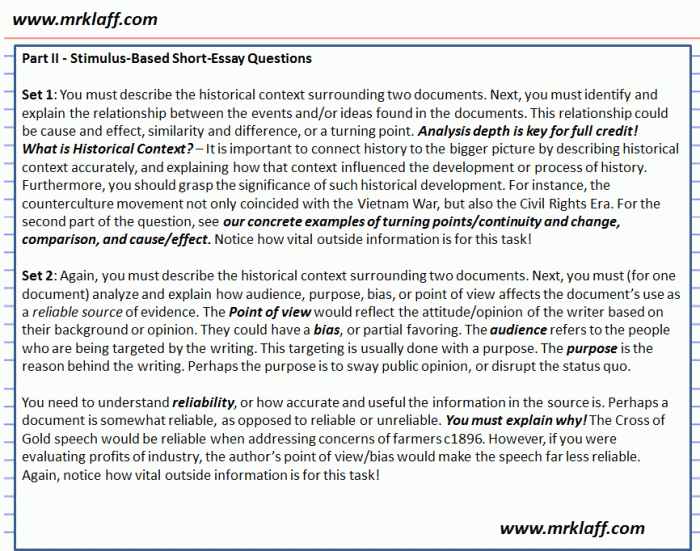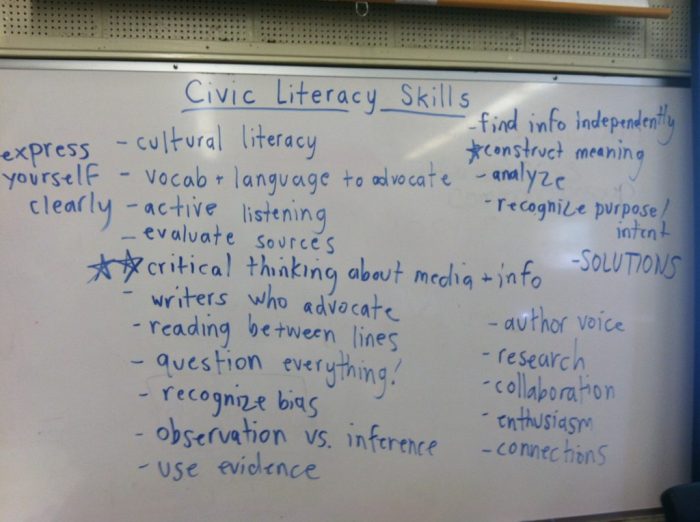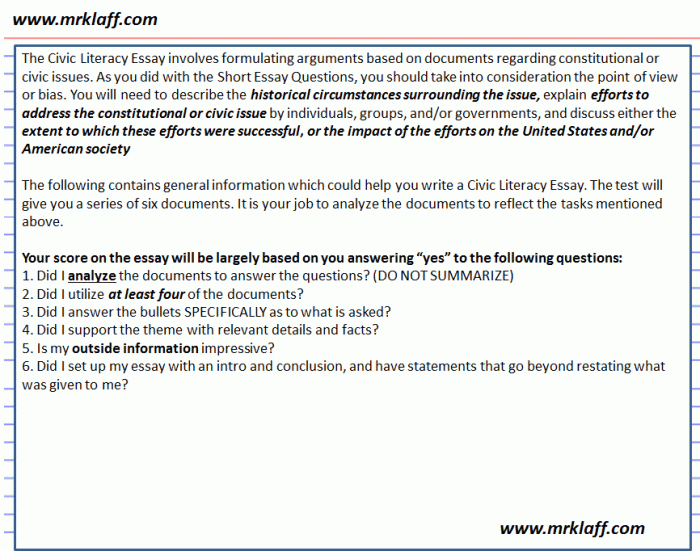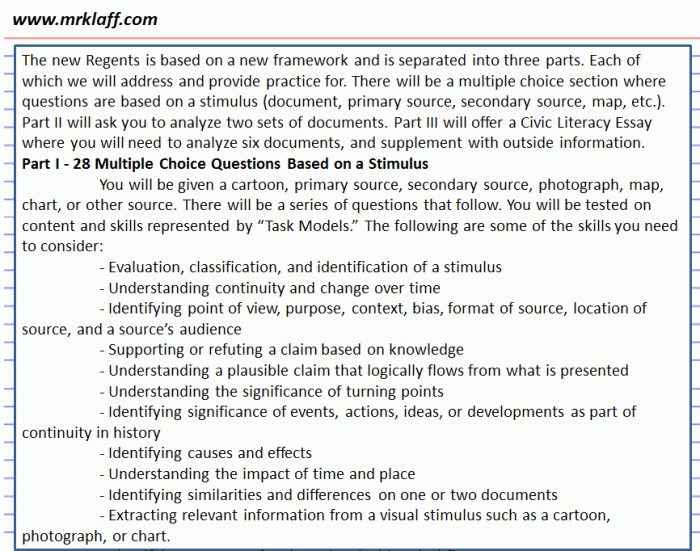Civic literacy essay us history regents – Civic literacy is a crucial component of the US History Regents exam, testing students’ understanding of key concepts and their ability to apply them to real-world situations. This essay will provide an overview of civic literacy, its importance in the exam, and effective strategies for improving civic literacy skills.
The Regents exam is a standardized test that assesses students’ knowledge and skills in various subjects, including US history. Civic literacy is a significant part of the exam, with questions that cover topics such as the structure and functions of government, the rights and responsibilities of citizens, and the historical development of civic institutions.
Civic Literacy in US History Regents Exam

Civic literacy is essential for the US History Regents exam, enabling students to demonstrate their understanding of historical events and their relevance to contemporary society. This literacy encompasses knowledge of government structure, political processes, and the rights and responsibilities of citizens.
The exam assesses civic literacy through multiple-choice questions, short answer responses, and essay prompts. Students must demonstrate their ability to:
- Identify key historical documents and their significance
- Analyze political cartoons and other primary sources
- Explain the causes and consequences of major historical events
- Discuss the role of individuals and groups in shaping US history
- Evaluate the impact of government policies on society
To improve civic literacy for the exam, students should:
- Study the course content thoroughly, focusing on key concepts and themes
- Read historical documents and primary sources to gain a deeper understanding of the past
- Participate in class discussions and debates to develop their critical thinking skills
- Complete practice questions and essays to familiarize themselves with the exam format
Key Concepts in Civic Literacy

Civic literacy is the ability to understand and engage with civic life. It encompasses knowledge of government, politics, and the rights and responsibilities of citizens.
Civic literacy has developed over time in the United States, from the founding fathers’ emphasis on self-government to the modern focus on informed citizenship. Today, civic literacy is essential for effective participation in a democratic society.
Major themes and concepts covered in civic literacy education include:
- The structure and function of government
- The electoral process
- The rights and responsibilities of citizens
- The role of the media in a democracy
- The importance of civic engagement
Methods for Teaching Civic Literacy: Civic Literacy Essay Us History Regents

Effective methods for teaching civic literacy in US history classrooms include:
- Inquiry-based learning: This approach encourages students to ask questions, research topics, and develop their own conclusions.
- Project-based learning: This approach allows students to work on projects that demonstrate their understanding of civic concepts.
- Simulations and role-playing: These activities allow students to experience firsthand the challenges and rewards of civic engagement.
- Service learning: This approach connects students with their community and provides them with opportunities to apply their civic knowledge.
Lesson plans and activities that promote civic literacy include:
- Analyzing historical documents: Students can analyze primary and secondary sources to gain a deeper understanding of historical events and their impact on society.
- Conducting mock elections: Students can participate in mock elections to learn about the electoral process and the importance of voting.
- Participating in community service projects: Students can volunteer their time to help others and learn about the importance of civic engagement.
Technology can enhance civic literacy by providing students with access to a wide range of resources, including historical documents, primary sources, and interactive simulations.
Assessment of Civic Literacy

Civic literacy can be assessed through a variety of methods, including:
- Multiple-choice questions: These questions test students’ knowledge of key civic concepts.
- Short answer responses: These questions require students to explain their understanding of civic concepts in their own words.
- Essays: These questions require students to analyze a topic and present their own arguments.
- Projects: These assignments allow students to demonstrate their understanding of civic concepts through creative projects.
Assessment tools and rubrics can help teachers to evaluate students’ civic literacy. These tools should be aligned with the learning objectives of the course and should assess students’ knowledge, skills, and dispositions.
Challenges in assessing civic literacy include:
- The complexity of the subject matter
- The need to assess both knowledge and skills
- The importance of assessing students’ dispositions towards civic engagement
Best practices in assessing civic literacy include:
- Using a variety of assessment methods
- Creating clear and specific learning objectives
- Providing students with feedback on their work
- Using assessment to inform instruction
Commonly Asked Questions
What is the importance of civic literacy in the US History Regents exam?
Civic literacy is crucial in the exam as it tests students’ understanding of the structure and functions of government, the rights and responsibilities of citizens, and the historical development of civic institutions.
How is civic literacy tested on the Regents exam?
Civic literacy is tested through multiple-choice questions, short answer responses, and essay questions that assess students’ knowledge of key concepts and their ability to apply them to real-world situations.
What are some effective strategies for improving civic literacy for the Regents exam?
Effective strategies include actively participating in class discussions, completing practice questions, utilizing online resources, and engaging in mock debates or simulations.